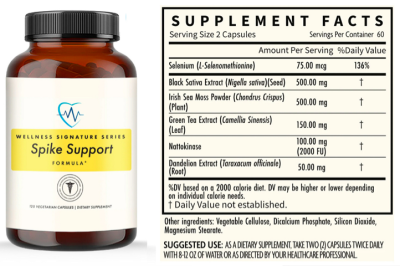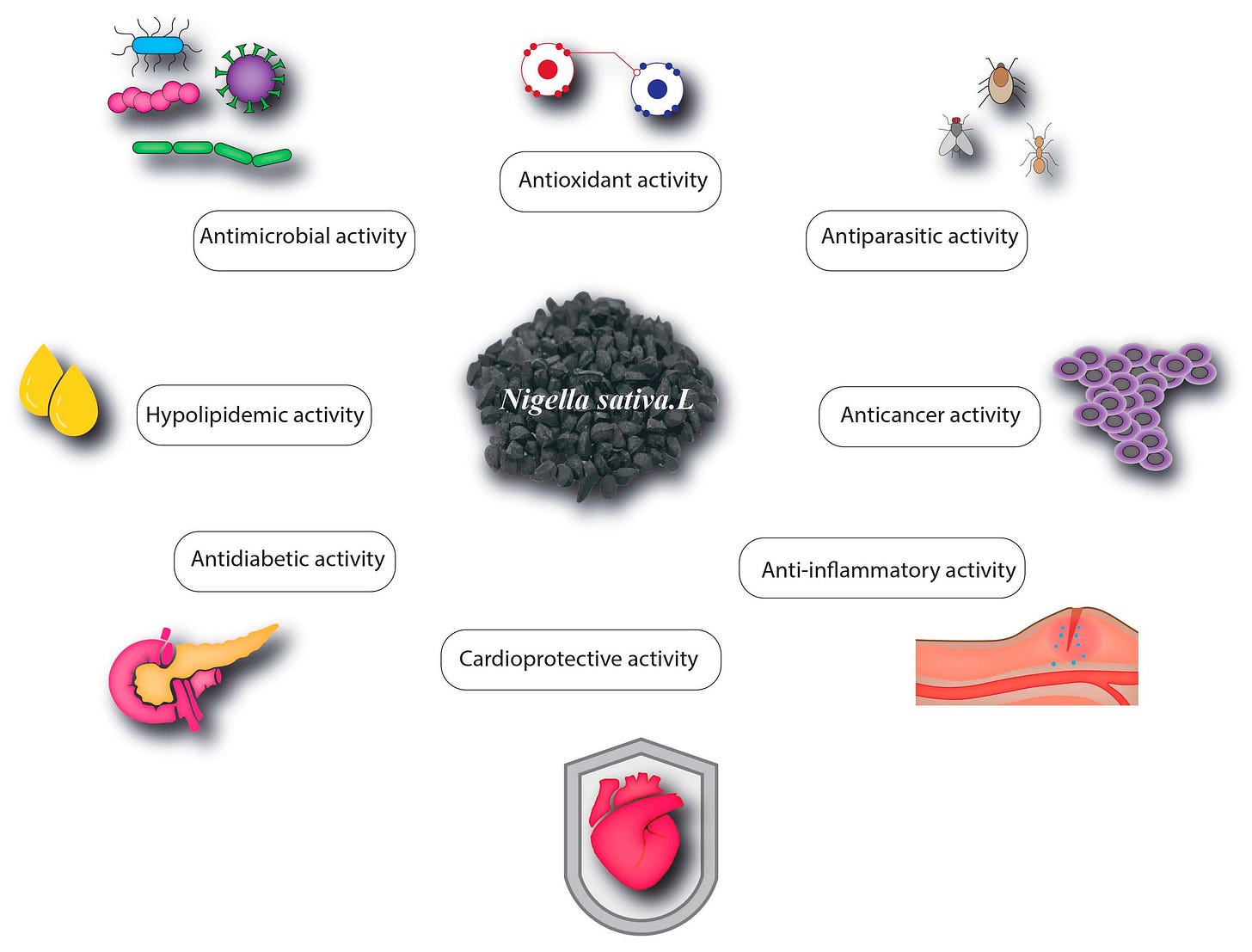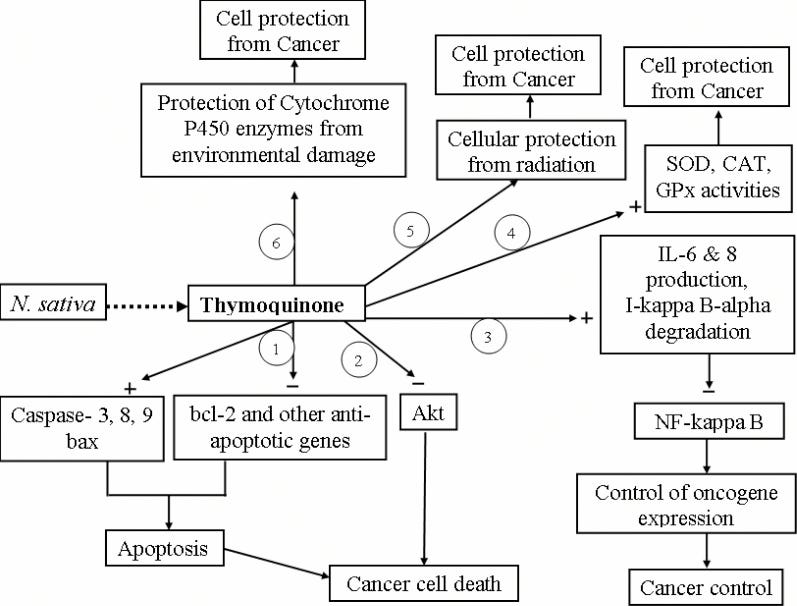COVID-19 mRNA Vaccine Injury Treatment – Nigella Sativa (Black Seed Extract)

All Global Research articles can be read in 51 languages by activating the Translate Website button below the author’s name.
To receive Global Research’s Daily Newsletter (selected articles), click here.
Click the share button above to email/forward this article to your friends and colleagues. Follow us on Instagram and Twitter and subscribe to our Telegram Channel. Feel free to repost and share widely Global Research articles.
***
The seeds of Nigella sativa, commonly known as black seed or black cumin, are used in folk (herbal) medicine all over the world for the treatment and prevention of a number of diseases (click here).

In South Asia, it is called Kalonji.
Its Arabic name is Habat-ul-Sauda.
Its English name is Black cumin.
Nigella Sativa is used as a spice in Indian and Middle Eastern cuisine. The black seeds taste like oregano and have bitterness to them like mustard-seeds.
Much of the biological activity of the seeds has been shown to be due to thymoquinone.
In Islamic literature, Nigella Sativa is considered as one of the greatest forms of healing medicine. It has been recommended for using on a regular basis in Tibb-e-Nabwi (Prophetic Medicine). (click here)
Folk Medicine Uses
The seeds have been traditionally used in the Middle East and Southeast Asian countries to treat ailments including asthma, bronchitis, rheumatism and related inflammatory diseases, to increase milk production in nursing mothers, to promote digestion and to fight parasitic infections. Its oil has been used to treat skin conditions such as eczema and boils and to treat cold symptoms.
Its many uses have earned Nigella the Arabic approbation ‘Habbatul barakah‘, meaning the seed of blessing. Nigella Sativa seeds and their oil have a long history of folklore usage in Arabian and Indian civilization and are used in food as well as medicine. The seeds are used as flavouring, to improve digestion and produce warmth, especially in cold climates. They are sometimes scattered in the folds of woollen fabrics to preserve them from insect damage.
In India the seeds are used as a carminative and stimulant to ease bowel and indigestion problems and are given to treat intestinal worms and nerve defects to reduce flatulence, and induce sweating. Dried pods are sniffed to restore a lost sense of smell. (click here)
In Moroccan traditional medicine, the plant is used to treat illnesses such as allergy, heart disease, hypertension, scarring, dermatitis, abdominal pain, stomach ache, vomiting, osteoarthritis, and rheumatic pain (click here)
How the COVID-19 Vaccinated Can Benefit

Source: (Click here)
-
antimicrobial against wide variety of bacterial, fungal and parasitic organismsincluding tape worms, hook worms and nodular worms (click here)
- works against Staph, Salmonella, E.Coli, Shigella, Pseudomonas (click here)
- works against fungal diseases like Candida and Aspergillosis (click here)
- anti-viral: blocks ACE2 receptors, acts as Zinc ionophore to enhance Zinc entry into cells for anti-viral effects in COVID-19 (click here)
- anti-inflammatory: reduces skin rashes, edema, granuloma formation (click here)
- treats gastrointestinal disorders: anti-ulcer activity, anti-colitis activity (click here)
- anti-hepatotoxicity: protects liver from various toxins (antioxidant effect of thymoquinone) (click here)
- anti-nephrotoxicity: protects kidneys from chemo toxicity, proteinuria, albuminuria, hyperlipidemia with nephrotic syndrome (also antioxidant effect of thymoquinone) (click here)
- treats asthma, bronchospasm and chest congestion (nigellone is the active ingredient that inhibits histamine release from mast cells) (click here)
- treats dyslipidemia: lowers serum cholesterol, triglycerides and glucose (click here)
- anti-diabetic activity (click here)
- analgesic – has potent analgesic effects through opioid receptors
- treatment of multiple sclerosis – thymoquinone shown to have a role (click here)
-
anti-cancer activity: thymoquinone has activity against leukemias, breast cancer, colon cancer, pancreatic adenocarcinoma, hepatic cancer, lung cancer, renal cancer, prostate and cervical cancers (click here)

Safety
Seeds of Nigella sativa have a long history of use for food and medicinal purposes. No adverse or side effects have been reported when used within the recommended dosage, although dermatitis has been reported. (click here)
(Note: Pregnant women, children under 18 should consult a physician before taking any supplement discussed)
My Take…
Nigella Sativa binds the COVID-19 mRNA vaccine spike protein and may prevent damage done to body tissues by the spike protein.
At least 8 published studies have shown evidence of this effect (click here)
It also has numerous benefits: it is a powerful anti-microbial and anti-parasitic, as well as anti-viral, great for those whose immune systems were damaged by the jabs.
It is a powerful anti-inflammatory: used for skin rashes, asthma, ulcers and colitis.
It is an antioxidant, it protects the liver and kidneys from injury by the spike protein.
It has anti-cancer properties via thymoquinone against numerous cancers including aggressive ones like leukemias, pancreatic adenocarcinomas and common cancers like breast, prostate, lung and colon.
*
Note to readers: Please click the share button above. Follow us on Instagram and Twitter and subscribe to our Telegram Channel. Feel free to repost and share widely Global Research articles.
Dr. William Makis is a Canadian physician with expertise in Radiology, Oncology and Immunology. Governor General’s Medal, University of Toronto Scholar. Author of 100+ peer-reviewed medical publications.

